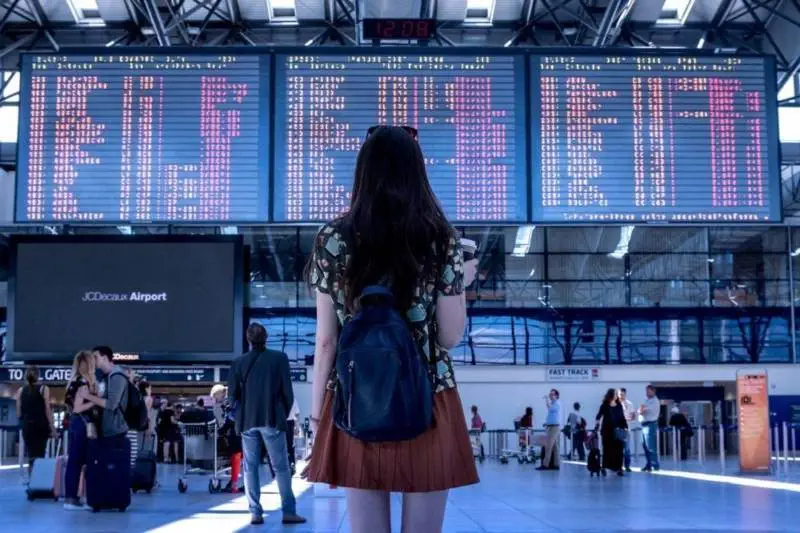Table of Contents
Dear first-time international traveler,
Sit down and grab a beer, coffee, or tea. No, seriously, if you’re not reading this letter with a beverage of choice in hand, stop reading and go get one.
There. That’s better.
You might be feeling nervous about traveling internationally because you’ve read some horror story online, or your friends have told you a crazy story about this one time at a hostel…? You know he’s prone to exaggerating, and you also know not to believe everything you read online, but still… It’s a nagging sort of fear, combined with uncertainty and ‘who do I believe?’.
I want to start by hitting you with a cold, hard, truth:
The people having a great time traveling are typically too busy to share that fact online.

We may share a photo on Facebook or Twitter, but people that are living it up are too busy living it up! The folks you see on message boards or forums are too often bitter expats, sometimes too cynical for their own good. Bloggers (like myself) try to even things up where we can, but it’s a balancing act to get traveling, writing, photography, and online time all in the necessary proportions.
In any case…
A traveler needs three things when they travel. That’s it. No more, no less.
I won’t get into the wisdom of packing lists, or even talk about where you’ll be going. The internet has plenty of those — heck, I might even get around to writing one or two of those myself. But not here and not now.
Thing you need #1: Street smarts
Being aware of your surroundings is a pre-requisite most anywhere you go in this world, and traveling is no exception. You probably know most of the other street smarts on this list:
- Know where you’re going — or at least look like you know where you’re going
- Don’t flash expensive jewelry or electronics — it paints you as a target
- Don’t be visibly drunk — again, it paints you as a target
- Aim to blend in — the less you stand out the better.
- Keep an eye out on what’s happening around you.
Nothing fancy here, right?
Thing you need #2: Traveling smarts
While one might equate ‘street smarts’ to ‘traveling smarts’, I’d mightily disagree. Where street smarts are universal to most anyone and anywhere, I’d argue travelers will often find themselves at a disadvantage when it comes to information or time — whether you do hours of internet research or just show up to a place, perfect information while traveling is usually not possible. Travelers are typically more tied to a schedule than the locals — doubly so if you have a boat, train, bus, or plane to catch. Either of these can give a local a much easier chance to take advantage of you. The goal here is to either reduce or eliminate that advantage with knowledge and your gut feeling about a place or person.
In general, I say be skeptical of anyone who approaches you speaking your language. The best tricksters have had years (or decades!) to perfect their pitch and figure out what it is a tourist wants or needs from 50 meters away. It’s really not that hard — think about how much information you telegraph when you pull out a map or your guidebook. The kind, generous people you tend to meet while traveling tend not to offer their assistance until you clearly need it in some way.
I’d also caution you in countries where the local GDP is a small fraction of where you’re from. While many locals are kind and warm-hearted, every country has opportunistic types that see the hundreds (or thousands) of dollars worth of tech you’re carrying around. Even if you’re not flashing them around, maintain the look of poverty where possible.
Again, not too hard, right?
Thing you need #3: Location smarts
One of my good friends found himself in the middle of Bangkok with his wife. Despite years of experience in navigating Asian cities, Bangkok threw him for a loop — and the traffic certainly didn’t help. He opted for what I’d call the last resort option — a unmetered tuk-tuk ride that eventually got him where he wanted to go, albeit several times the price of a taxi. Later that day, he learned there was a bus route that took the exact same route along the main road and stopped right outside his hotel. After mentally kicking himself, he found an app for his phone that showed Bangkok’s bus routes in one place.
It’s difficult to offer specific advice on this one — there is, however, a universe of blogs, apps, and websites offering directions or guides to assist. It’s just a matter of searching for them and selecting the best one you find.
Assuming you have a smartphone and a local SIM card inside, Google Maps is free and works well for 90% of mainstream tourist attractions you’re likely to visit. If you lack a smartphone, I’d really recommend picking one up during (or for) your travels — bear in mind the ‘unlocked’ varieties will work fine abroad, while some will be locked to a single carrier only. (Plenty of shops around the world can unlock a phone for a fee.)
If you travel to weird or offbeat places like we do, then GPS coordinates will be your best friend. Anywhere a street address is questionable is where GPS coordinates begin to shine — especially when you can tell the taxi driver ‘go left’, ‘go right’, and ‘straight’ to arrive at the place.
If you simply must ask directions of a local, be specific. Show the name of the place in the local language, bearing in mind the popular name may differ from the proper name. In countries where maintaining ‘face’ is important (and saying they don’t know would cause them to lose face), you may need to ask a few different people to get a consensus.
Note there’s nothing mentioned about knowing which way north is — if you’re the sort that naturally knows that then brilliant! — for the rest of us, it’s almost never come into play.
That’s it — that’s all you need
What’s that? You wanted more? Sorry, that’s all I have to offer right now. You can certainly check out Matt Kepnes’ guide to traveling the world on $50 a day. As reviewed recently, it’s worth the coin to take in the tips and tricks of a world traveler — and there are plenty of specific tips for countries around the world.


